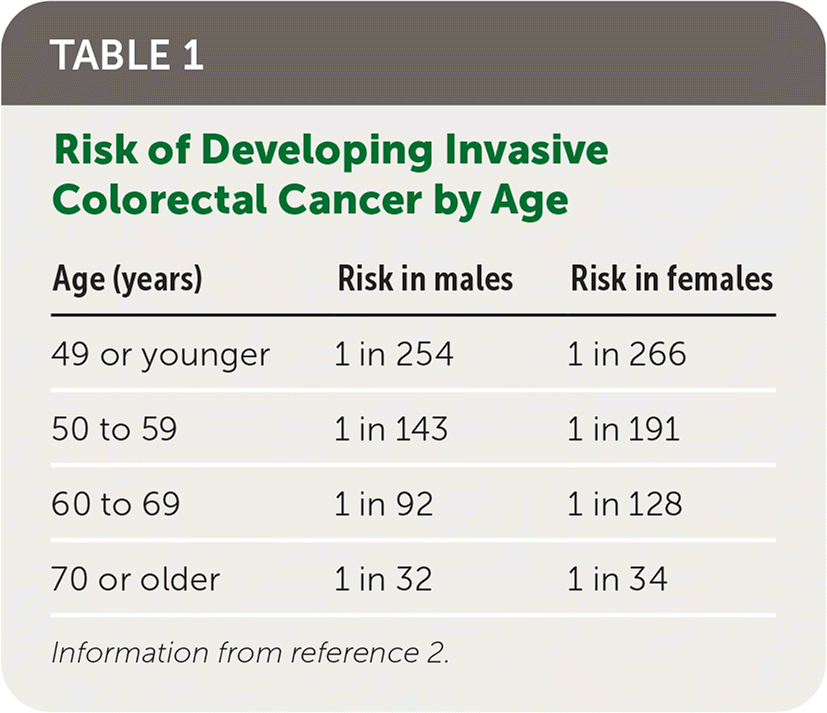
Am Fam Physician. 2022;105(2):118-119
Related editorial: Should Routine Screening for Colorectal Cancer Start at 45 Years of Age? Yes: Lowering the Starting Age Is a Settled Issue
Author disclosure: No relevant financial relationships.
Colorectal cancer is the third leading cause of cancer-related death in both men and women, behind lung and breast cancers, and is second only to lung cancer when men and women are combined.1 The American Cancer Society estimates that there were 149,500 new cases of colon or rectal cancer in 2021, with 52,980 deaths.2 The probability of developing invasive colorectal cancer increases substantially with age (Table 1).2

| Age (years) | Risk in males | Risk in females |
|---|---|---|
| 49 or younger | 1 in 254 | 1 in 266 |
| 50 to 59 | 1 in 143 | 1 in 191 |
| 60 to 69 | 1 in 92 | 1 in 128 |
| 70 or older | 1 in 32 | 1 in 34 |
The U.S. Preventive Services Task Force (USPSTF) recently updated its recommendation statement on colorectal cancer screening. The USPSTF continues to recommend screening in all adults 50 to 75 years of age regardless of risk and individualizing screening for patients 76 to 85 years of age based on screening history and health status.3 The American Academy of Family Physicians (AAFP) agrees with these recommendations.4 Screening options include fecal tests (e.g., high-sensitivity guaiac fecal occult blood testing, fecal immunochemical testing [FIT], and stool DNA-FIT), flexible sigmoidoscopy, computed tomographic colonography, or colonoscopy.3 The determination of which modality to use should be based on shared decision-making, taking into account individual preferences and feasibility of testing.
New to the USPSTF's updated guideline is a recommendation to screen individuals 45 to 49 years of age. In response, the AAFP's Commission on Health of the Public and Science reviewed the recommendation and supporting evidence.3–6 The AAFP disagrees with the USPSTF, concluding that there is insufficient evidence to assess the benefits and harms of colorectal cancer screening in this age group (I statement).4 Indirect evidence from modeling studies supports the USPSTF's recommendation to start screening at 45 years of age.6 However, many of the trials used in the modeling studies did not include individuals younger than 50 years or did not provide separate data for this younger age group, decreasing confidence in the data inputs. Additionally, the modeling studies assumed 100% adherence to screening and follow-up protocols, which may artificially increase life-years gained from earlier screening.
In addition to insufficient evidence to support beginning screening at 45 years of age, the potential cost to patients and the health care system should be considered. Focusing resources on screening higher-risk patients may be more beneficial. Shifting screening to the 21 million Americans 45 to 49 years of age may prevent an estimated 29,400 colon cancer cases and 11,100 colon cancer deaths over five years, but with 10.7 million additional colonoscopies and a cost of $10.4 billion. In contrast, expanding screening to up to 80% of eligible patients 50 to 75 years of age would prevent three times as many colon cancer deaths at one-third of the cost.7
Similar to the USPSTF, the AAFP calls for more research into the benefits and harms of screening younger adults at average risk of colorectal cancer.3,4 In terms of implementation, an I statement does not necessarily mean “do not screen,” but that there is not enough evidence to make a recommendation. Because the USPSTF recommendation will result in insurance coverage for colorectal cancer screening in patients 45 to 49 years of age, family physicians should advise patients about the current limited evidence and discuss the potential risks and benefits with those interested in being screened. The AAFP recommendations do not apply to adults who are symptomatic and need diagnostic testing or who are at increased risk of colorectal cancer, such as those with genetic disorders (e.g., familial adenomatous polyposis, hereditary nonpolyposis colorectal cancer) or inflammatory bowel disease.
The AAFP recognizes the higher incidence of colorectal cancer and related mortality in Black patients and acknowledges that earlier screening may be beneficial in these patients.4,8 However, we feel this health disparity likely arises from systemic racism and inequities in the health care system. Lower screening rates for colorectal cancer in Black patients are most likely due to less access to care and insurance coverage, resulting in fewer follow-up colonoscopies and repeat screenings.9 Family physicians can play a vital role in reducing colorectal cancer disparities by using standardized screening protocols, monitoring their practice's policies and protocols for addressing disparities, and engaging patients in discussions about the value of appropriate colorectal cancer screening.9 The AAFP continues to advocate for national policies and plans to address health disparities and has provided resources on social determinants of health and implicit bias as part of its EveryOne project (https://www.aafp.org/everyone).
